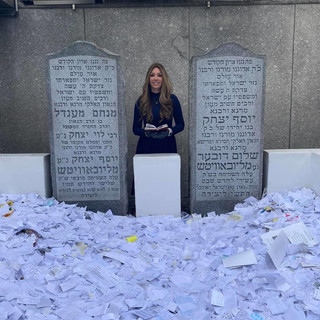How to reach perfection in prayer
- Esther Nava

- Jul 29, 2020
- 4 min read
Updated: Sep 8, 2020
Our sages teach us that “prayer stands at the heights of the world”. With it, explains Rebbe Nachman of Breslev, we can change pretty much anything in the world, provided that the prayer is appropriate. Yet, the sages also say that these are the things that people often neglect and don’t see much value in the effort put in.
So, you may be asking yourself: how can I perfect my prayer and be answered swiftly?
That’s a very fair, but not easy question. Here in this article, we will try to give a few general principles of what makes a prayer strong. Make no mistake, however; sometimes, no matter how much we pray, there are certainthings that will never change.
For example, you can’t force someone to sinor divorce by means of prayer. Likewise, you can’t change Hashem’s overall judgment and master plan because these are things that are outside our grasp. Even if there’s something in our range of influence (like parnassah, sustenance), we need to be ready to accept that maybe Hashem wants us in a certain situation for a set period of time in order to expiate certain sins, from our present lifetime or an earlier one.
There are many factors that Hashem takes into consideration in order to accept and fulfil a prayer.
The first is the merits of the person himself. A person who is full of sins or bad character traits will have a hard time seeing his prayers answered. For example, the sages teach that one who wears Sha’atnez (mixture of linen and wool) has his prayers torn up. Hashem has a particular love for ba’alei teshuva, converts and the downthrodden, and tend to accept their prayers much faster. Conversely, someone who has climbed the rungs of spiritual development by working on his Middot will have his prayers listened much faster.
Notice that when we say “listen”, we shouldn’t think Hashem has physical ears. The intent is that the spiritual powers inside the words of prayers rise to go before the Holy Throne in the world of Beriyah (Creation), where they effect what they are supposed to do.
The time and place a person is in also have heavy influence on the quality of prayer. Festive occasions such as Rosh Hashana, Yom Kippur, Shabbat and Lag Baomer and so on have a special radiance that breaks the power of the Sitra Achra (Other Side, evil) and allows prayer to go up much more easily. One standing next to the Kever of a Tzaddik also has the advantage of using the spiritual pillar as a shortcut as we explained in many articles.
If you are interested in sponsoring Emunah Builders Prayer Track, don’t forget to sign up to my newsletter and go to the
Another important factor we can cite is the emotions from the heart. This can be explained as that intense yearning and love for Hashem, the feelings of Teshuva (repentance). A person should ideally pray having in mind that the Shechina (Hashem’s immanent presence with the world) is suffering with us and therefore we want to alleviate its pain. The sages teach us in many places that one who prays on behalf of someone is sure to be answered first. Now, this might sound like “cheating”, because someone could think he can easily pray for someone in order to be answered, right? Rabbi Meir of Premishlan explains that the meaning of this statement is that a person feels so much the other person’s pain that he feels compelled to pray on his behalf, and in doing so he is saved first!
While difficult to attain, perhaps the most important factor however is tears! Someone who can cry while praying will almost certainly be answered as we learn that the Gates of Tears are never locked.
Nevertheless, the Ba’al Shem Tov explains in Tzava’at HaRivash (his “testimony”, a collection of teachings he left) that a person should always strive to pray in a state of joy. Even tears need to come from a deep longing for Hashem, never out of sadness. In fact, Rabbi Chaim Vital explains at the beginning of Sha’ar HaKavanot (Gates of Mystical Intentions) in the name of the Arizal that it’s forbidden to pray (supposedly, the Amidah) while sad.
There used to be a time when we had the Holy Temple, and a very special unity of the Divine Names was constantly in place. To put it into a better perspective, the spiritual situation we have today on Shabbat is what they used to have when the Holy Temple was standing!
Prayer is a skill that has to be developed by each and everyone of us. It’s one of the most important things we can ever learn how to do because it enables us to conquer our challenges.
While we sadly don’t have the Temple and we are reminded this Tisha B’Av of our loss, there’s much we can achieve with prayer, if we put the effort in it!
This article was written and published in the zechut of all Emuna Builder Partners. May they have complete emuna and continue spreading emuna!



Comments